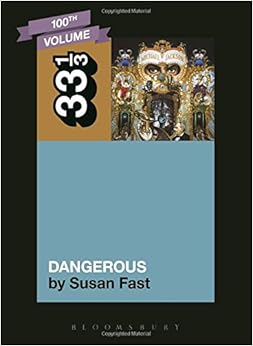Reading Diary: 33 1/3 Edition
a) Dangerous, by Susan Fast
I've read a lot of books in the 33 1/3 series, and occasionally do roundup posts about them here, although I haven't done one in a while (see previous ones here, here, here, here, and here). Most of the books in the series are about the artist's most popular or most revered album or something with a strong cult following, and that makes sense. But I'm always intrigued when they publish something about a more unexpected choice, which is why I was very curious to read this one. I grew up in the post-Thriller world -- Bad was the first cassette of popular music I remember my brother and I having, and Dangerous was an album I kind of heard disinterestedly as I started to more actively listen to Guns 'N Roses or Pearl Jam or whatever. Fast really delves deeply into musical analysis that Michael Jackson's later music never really got amidst the lurid tabloid media coverage, and tries to construct some new narratives and insights about his persona, his emotional headspace, his sexuality and his musical influences that go beyond just the conventional wisdom about his ruthless commercial instincts and 'paranoid' lyrics. Sometimes I think she overcorrects a little and spends pages and pages just arguing with previously published reviews, but it's still a pretty compelling look at an album that's a little more ripe for reevaluation than, say, Thriller.
b) Flood, by S. Alexander Reed and Philip Sandifer
They Might Be Giants are a great band that I think have always been wanting for good, insightful criticism instead of affirmations or denials of their 'nerdy' reputation. And while this book does attempt to put the bands' place in this in perspective, and makes a compelling case that this album, which eventually went platinum, representing a large scale mainstream breakthrough of nerd culture in the early '90s, it also does tackle some of the unique aspects of their songwriting without just boiling it down to wackiness. Unfortunately, I kinda hate the way this book was written -- there's constant throat-clearing announcements of what they will address in future chapters, and references on every page to their vague concept about the 'aesthetic of flooding' that have nothing to do with the actual origin of the album titles, which they reveal about a hundred pages in. By the end I was just rolling my eyes constantly and feeling very annoyed by how repetitive such a short book became.
c) Marquee Moon, by Bryan Waterman
A surprisingly small number of 33 1/3 books give you a really definitive story of the album's genesis or the artist's career -- usually it's taken for granted that you know that and want critical analysis or the author's personal angle. But this book is really an incredibly well researched and compelling breakdown of how Television came together, how they refined their sound and their repertoire for years before recording Marquee Moon, and some details of how it came together in the studio. You get really detailed remembrances of the CBGB's days, not just the big anecdotes everyone knows. I've read a lot about the band and that whole scene, but a lot of the things in this book were new to me. If maybe Television was a more famous band, this could've deservingly been a big hardcover book with photos, so it was kind of a pleasant surprise to get something of that caliber in a 33 1/3 book.

Post a Comment